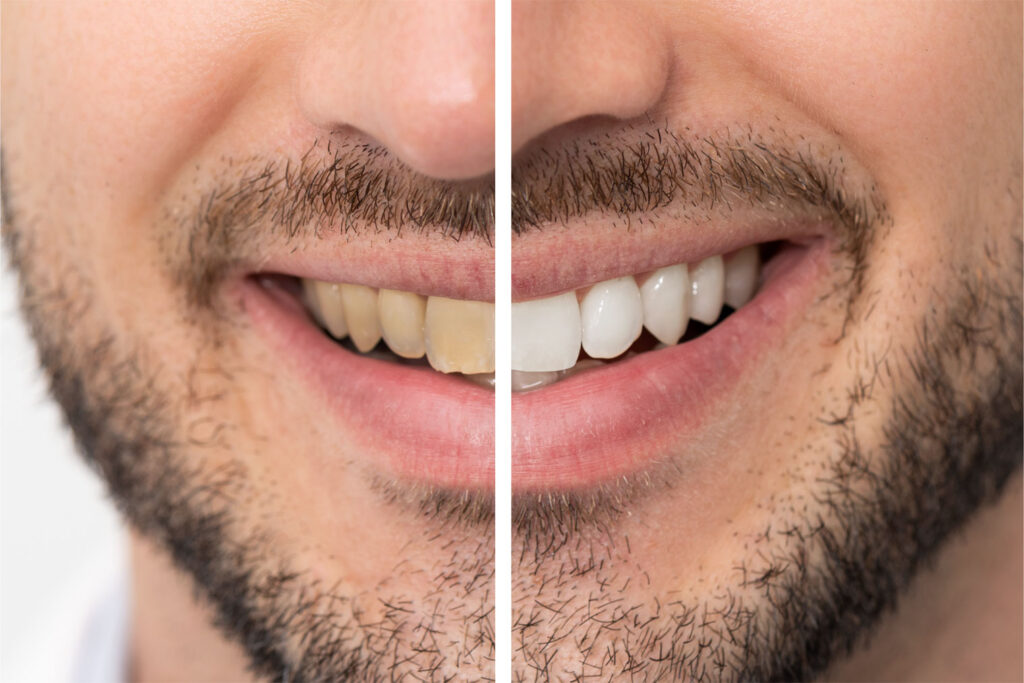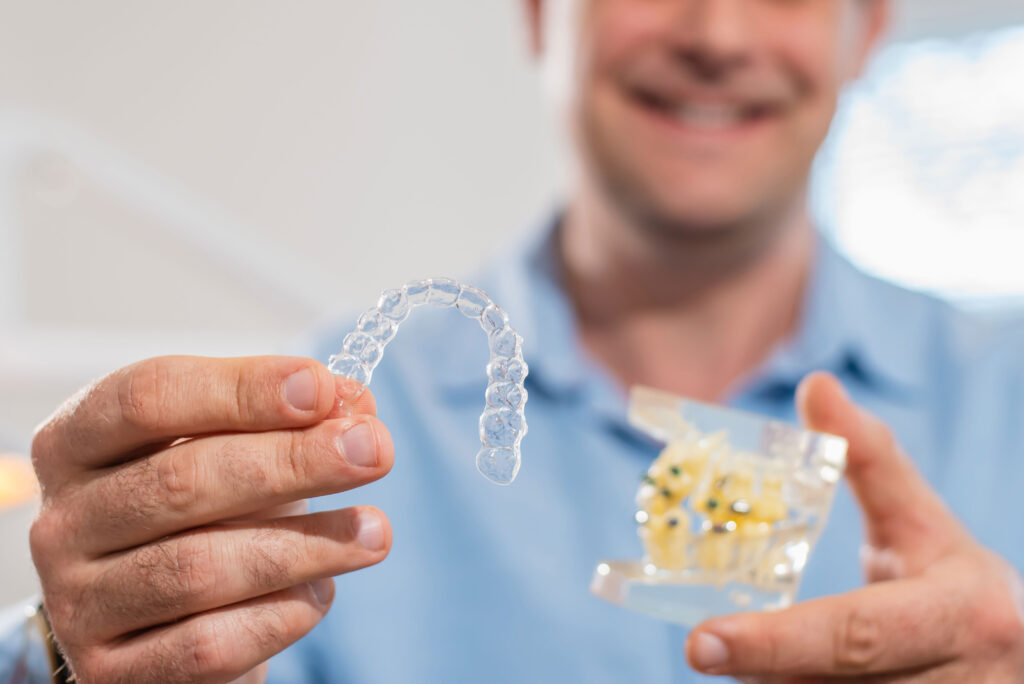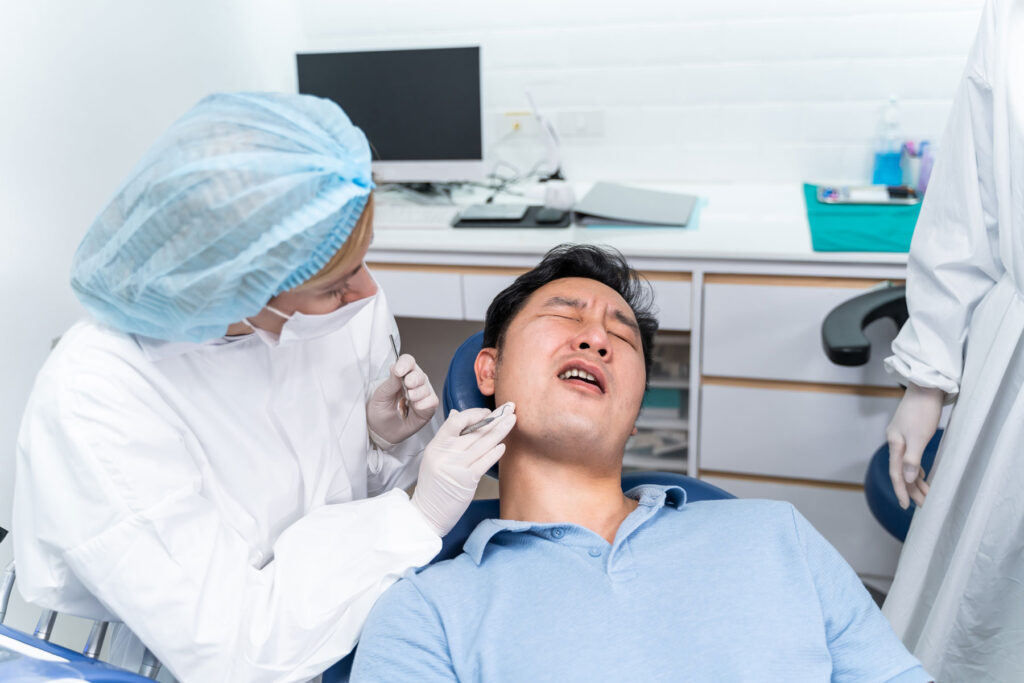
You might think brushing right after a meal is the best way to clean your teeth, but when it comes to breakfast, it can actually cause more harm than good. If you’re asking, “should you brush your teeth before or after breakfast?”, it’s crucial to understand the potential downsides of brushing immediately after eating. This has everything to do with enamel erosion from acidic foods and drinks, and the optimal brushing teeth timing.
Here’s what happens if you brush your teeth right after breakfast:
- Acid Attack: Many common breakfast foods and drinks are acidic. Think about orange juice, coffee, fruit, yogurt, and even toast (carbohydrates break down into sugars, which oral bacteria convert into acids). When you consume these, the acids temporarily soften your tooth enamel. It’s like a very brief, microscopic acid bath for your teeth.
- Enamel Softening: This softening effect makes your enamel more vulnerable to abrasion. It’s not that the enamel dissolves, but its surface becomes less rigid and more susceptible to wear.
- Brushing Abrasively: If you immediately brush your teeth with toothpaste and a toothbrush while your enamel is in this softened state, you can literally brush away tiny particles of that softened enamel. This accelerates the process of enamel erosion over time. Even if you’re using proper brushing techniques and a soft-bristled brush (which we always recommend at Smiles for Health DDS), the combination of acid and abrasion is problematic for brushing teeth timing.
- Long-Term Damage: Repeatedly brushing softened enamel can lead to:
- Increased Sensitivity: As enamel wears away, the underlying dentin (which contains microscopic tubules leading to nerve endings) becomes exposed, causing discomfort to hot, cold, or sweet stimuli.
- Yellowing Teeth: Dentin is naturally more yellowish than enamel, so thinning enamel makes your teeth appear less white. Teeth whitening might not be as effective if enamel is significantly thinned.
- Higher Cavity Risk: Weakened enamel is more susceptible to dental fillings and decay.
Understanding these risks is vital for optimal brushing teeth timing. It highlights why many dental professionals advise against immediate post-breakfast brushing. Our team at Smiles for Health DDS is dedicated to providing you with the best preventive dentistry strategies, ensuring your smile stays healthy and strong. To learn more about protecting your enamel and improving your oral hygiene, contact us today!
Why Do Dentists Recommend Brushing Before Breakfast?
Given the information about enamel erosion, the answer to “should you brush your teeth before or after breakfast?” becomes clearer: dentists overwhelmingly recommend brushing before breakfast. This isn’t just a random preference; it’s based on solid understanding of your oral biology and the best brushing teeth timing to protect your enamel and maintain fresh breath. At Smiles for Health DDS, we believe this simple shift can significantly enhance your morning oral hygiene.
Here’s why dentists recommend brushing before breakfast:
- Removes Overnight Plaque and Bacteria: While you sleep, bacteria in your mouth multiply and form plaque. Brushing before breakfast effectively removes this plaque, along with any lingering food particles and bacteria, right away. This means you start your day with a cleaner slate. This is essential when considering when to brush in the morning.
- Protects Enamel from Acid: By removing plaque before you eat, you’re preparing your teeth to better withstand the acid attack from breakfast foods and drinks. Your enamel is at its strongest before it’s exposed to dietary acids. If you consume something acidic, brushing before creates a protective layer. This highlights the ideal brushing teeth timing.
- Saliva Function and Fluoride Protection:
- Stimulates Saliva: Brushing jumpstarts saliva production. Saliva is your mouth’s natural rinsing system, helping to wash away food debris and neutralize acids. It also contains minerals that help repair and remineralize enamel throughout the day.
- Fluoride Benefits: When you brush with fluoride toothpaste (which we highly recommend at Smiles for Health DDS), brushing before breakfast allows the fluoride to coat your teeth and become a protective barrier before you introduce acidic foods. This fluoride layer makes your enamel more resistant to acid attacks. This works hand-in-hand with professional fluoride treatment.
- Freshens Breath: Waking up with “morning breath” is common because bacteria have been working overnight. Brushing before you eat helps to eliminate these odor-producing bacteria, giving you fresher breath to start your day.
- Controls Sugar’s Impact: If you eat sugary cereals or pastries, brushing before breakfast helps to reduce the amount of existing bacteria that would otherwise quickly convert those sugars into harmful acids.
This recommended brushing teeth timing is a key component of effective preventive dentistry. By making this small adjustment to when to brush in the morning, you’re taking a big step towards safeguarding your enamel and preventing issues like sensitivity and cavities. Our team at Smiles for Health DDS is always here to provide guidance on the best practices for your oral health. For a personalized consultation on your brushing routine and overall wellness dentistry, contact us today!
Is It Ever Okay to Brush After Breakfast Instead?
We’ve made a strong case for “should you brush your teeth before or after breakfast” leading to a “before.” However, life isn’t always perfect, and sometimes brushing before just isn’t feasible. So, is it ever okay to brush after breakfast instead? The short answer is yes, with important caveats and specific instructions on how to do it safely to minimize the risks to your enamel. At Smiles for Health DDS, we understand that flexibility is sometimes needed, but always with smart oral hygiene practices.
Here are exceptions and how to brush safely if you choose to brush after breakfast:
- Wait at Least 30-60 Minutes: This is the most crucial rule if you brush after breakfast. Give your saliva enough time to naturally neutralize the acids from your meal and allow your enamel to re-harden. Waiting for 30 to 60 minutes significantly reduces the risk of brushing away softened enamel. This waiting period is critical for proper brushing teeth timing.
- Rinse with Water or Mouthwash Immediately After Eating: If you can’t brush before breakfast, rinsing your mouth vigorously with plain water immediately after eating can help wash away food particles and some of the acids. A fluoride mouthwash can also offer some protection and help neutralize acids. This is a good interim step for when to brush in the morning if you choose after.
- Use a Soft-Bristled Toothbrush: Always use a soft-bristled toothbrush to minimize abrasion, especially if your enamel has been exposed to acids. Hard bristles can be too aggressive on softened enamel. Our team at Smiles for Health DDS can show you the correct brushing technique during your exams and cleanings.
- Use a Fluoride Toothpaste: Fluoride helps strengthen enamel and makes it more resistant to acid attacks. Ensure your toothpaste contains fluoride for maximum protection, particularly if you’re concerned about when to brush in the morning.
- Consider Your Diet: If you consistently brush after breakfast and your breakfast routinely includes highly acidic foods (e.g., lots of citrus fruits, fruit juice, black coffee), you are at higher risk of enamel erosion. Adjusting your breakfast choices or ensuring you wait the recommended time is even more critical.
While brushing before breakfast is the ideal, following these guidelines if you brush after breakfast will help protect your enamel. Consistency in your overall oral hygiene routine, including regular flossing and dental check-ups, is paramount for your long-term wellness dentistry. If you have specific concerns about your brushing teeth timing or enamel health, our friendly team at Smiles for Health DDS is always available to provide tailored advice. Contact us today!
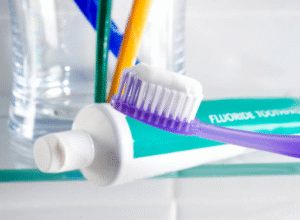
What’s the Ideal Morning Brushing Routine?
You’ve learned why “should you brush your teeth before or after breakfast?” leans heavily towards “before” for optimal brushing teeth timing. Now, let’s put that knowledge into action! Establishing an ideal morning brushing routine is simple and incredibly effective for protecting your smile throughout the day. At Smiles for Health DDS, we want to help you make these healthy habits second nature.
Here’s our step-by-step guide to the ideal morning brushing routine:
- Step 1: Brush Your Teeth First (Before Eating Anything!)
- As soon as you wake up, head straight to the bathroom to brush your teeth.
- Use a soft-bristled toothbrush and a fluoride toothpaste.
- Brush for at least two minutes, making sure to clean all surfaces of your teeth, your gum line, and your tongue.
- This step removes the overnight plaque and bacteria, gives you fresh breath, and coats your teeth with fluoride before they encounter any breakfast acids. This is the cornerstone of proper brushing teeth timing for when to brush in the morning.
- Step 2: Eat Your Breakfast:
- Now that your teeth are clean and protected, go ahead and enjoy your breakfast!
- Don’t worry about the acids in your food or drinks as much, because your enamel has already had its fluoride shield applied.
- Step 3: Rinse with Water or Chew Sugar-Free Gum (After Eating):
- After you finish eating, especially if you had acidic foods or drinks (like orange juice or coffee), a quick rinse with plain tap water is highly recommended. This helps wash away food particles and remaining acids.
- Alternatively, chewing a piece of sugar-free gum for about 20 minutes can also be beneficial. Chewing gum stimulates saliva flow, which is your mouth’s natural way of neutralizing acids and washing away food debris. Look for gum with xylitol for added benefits.
- Step 4 (Optional but Recommended): Floss or Use Interdental Cleaners:
- While brushing is crucial, flossing or using interdental cleaners (like small brushes that fit between your teeth) removes plaque and food particles from areas your toothbrush can’t reach.
- You can do this either before or after brushing – the key is just to make it a regular part of your routine.
Following this routine helps ensure that you’re starting your day with the cleanest, best-protected teeth. It optimizes your brushing teeth timing and sets you up for excellent oral health. Our team at Smiles for Health DDS is always here to provide personalized guidance for your wellness dentistry goals. To schedule an appointment and get more personalized tips for your morning oral care, contact us today!
Does Brushing Timing Affect Cavity Prevention?
You’re already thinking about “should you brush your teeth before or after breakfast?” and that’s a great start. This specific question about brushing teeth timing isn’t just about fresh breath; it plays a significant role in cavity prevention. Understanding when to brush in the morning directly impacts your teeth’s ability to fight decay, manage acid attacks, and control plaque buildup. At Smiles for Health DDS, we emphasize that timing really does matter for long-term cavity protection.
Here’s how brushing timing affects cavity prevention:
- Reducing Decay Before It Starts: The main reason we advocate for brushing before breakfast is to remove the overnight accumulation of plaque. Plaque is a sticky film of bacteria that constantly forms on your teeth. These bacteria feed on sugars from your food and drinks, producing acids that erode enamel and lead to cavities. By brushing before you eat, you significantly reduce the number of acid-producing bacteria present when you introduce your breakfast. This is a primary strategy for when to brush in the morning to prevent cavities.
- Minimizing Acid Attacks: As discussed, acidic foods and drinks temporarily soften your enamel. If you brush immediately after consuming them, you risk physically abrading that softened enamel. This constant wear over time thins your enamel, making your teeth more vulnerable to the acid produced by bacteria, thus increasing your cavity risk. Proper brushing teeth timing helps prevent these damaging acid attacks from being compounded by brushing.
- Maximizing Fluoride’s Role: When you brush with fluoride toothpaste before breakfast, the fluoride has a chance to coat and strengthen your enamel. This makes your teeth more resistant to acid erosion throughout the day. It’s like applying a protective shield. Fluoride also helps remineralize (rebuild) enamel that has been weakened by acids. This proactive approach is a cornerstone of effective cavity prevention, and it’s why brushing before is key for when to brush in the morning. Our team at Smiles for Health DDS can also provide professional fluoride treatment for an extra layer of protection.
- Controlling Plaque Buildup: Regular and effective brushing, regardless of timing, is crucial for removing plaque. However, starting your day by removing the overnight plaque load means less plaque is present to interact with your breakfast, reducing the acid production right from the start.
So, yes, brushing timing absolutely affects cavity prevention. By optimizing your morning routine and focusing on brushing teeth timing, you’re giving your teeth the best chance to fight off decay and stay strong. Our team at Smiles for Health DDS is dedicated to helping you master these habits as part of your comprehensive preventive dentistry plan. If you have questions about cavity prevention or want to schedule your next exams and cleanings, contact us today!
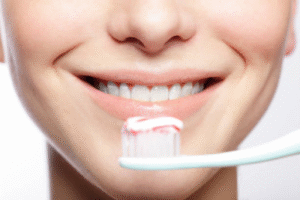
When Should Kids Brush Their Teeth in the Morning?
The question “should you brush your teeth before or after breakfast?” applies to children too, with some practical considerations. Establishing good oral hygiene habits early is vital for children’s dental health, and that includes the correct brushing teeth timing for their morning routine. At Smiles for Health DDS, we understand that children’s eating habits can be different, and we tailor our advice for children’s oral hygiene.
Here’s advice tailored for children’s oral hygiene and eating habits:
- Generally, Brush Before Breakfast is Best: Just like adults, kids also accumulate plaque and bacteria overnight. Brushing their teeth first thing in the morning, before breakfast, helps remove this buildup and provides a fluoride coating to protect their developing enamel from the acids in breakfast foods (like fruit juice, cereal, or fruit). This is the ideal when to brush in the morning for kids.
- Why It’s Extra Important for Kids:
- Developing Enamel: Children’s primary (baby) teeth and newly erupted permanent teeth have thinner, softer enamel than adult permanent teeth, making them even more susceptible to acid erosion and cavities.
- Common Breakfast Choices: Kids often eat sugary cereals, pastries, and drink juices or milk, all of which contribute to acid production and cavity risk. Brushing beforehand gives them extra protection.
- Consistency is Key: Establishing the “brush first” habit from a young age makes it easier for them to maintain good oral hygiene throughout their lives.
- Practical Tips for Kids’ Morning Routine:
- Make it a Habit: Encourage them to go straight to the bathroom to brush after getting out of bed, before coming down for breakfast.
- Supervision: Always supervise young children while they brush to ensure they’re using the correct technique and not swallowing too much toothpaste (a pea-sized amount of fluoride toothpaste is sufficient for children aged 3 and up). For younger kids, just a smear of fluoride toothpaste is enough.
- Fun Toothbrushes/Toothpaste: Let them choose a fun toothbrush or a toothpaste flavor they like to make it more appealing.
- What if They Insist on Eating First?
- If a child absolutely refuses to brush before breakfast, or if breakfast is always a rush, then the priority is ensuring they do brush effectively at some point in the morning.
- If they brush after breakfast, make sure they wait at least 30 minutes, or even better, an hour.
- Encourage them to rinse their mouth vigorously with plain water immediately after eating to wash away food particles and acids.
- Consistency is better than perfection. If brushing after is the only way it gets done, then that’s better than not brushing at all.
- Regular children’s dentistry check-ups are even more critical to monitor their enamel health and provide protective measures like dental sealants and fluoride treatment.
Our team at Smiles for Health DDS is here to support you and your children in developing excellent oral hygiene habits. We can discuss the best brushing teeth timing and answer all your questions about when to brush in the morning during your child’s exams and cleanings. Let’s work together for a lifetime of healthy smiles!
Frequently Asked Questions
Should you brush your teeth before or after breakfast for the best oral health?
Brushing your teeth before breakfast is recommended to remove plaque that has built up overnight. Smiles for Health DDS advises this timing to prevent acids from food interacting with bacteria, protecting your enamel and improving overall oral hygiene. This is a key consideration in deciding should you brush your teeth before or after breakfast.
How does brushing teeth timing affect morning breath and plaque control?
Brushing teeth timing plays a crucial role in reducing bacteria that cause bad breath and plaque formation. Smiles for Health DDS emphasizes that knowing when to brush in the morning can make a significant difference in oral freshness throughout the day.
Is it harmful to brush teeth immediately after eating breakfast?
Yes, brushing right after acidic foods can weaken enamel temporarily. Smiles for Health DDS suggests waiting at least 30 minutes after eating before brushing to avoid damaging tooth enamel, which relates directly to should you brush your teeth before or after breakfast.
Can brushing before breakfast reduce the risk of cavities?
Brushing before breakfast helps remove overnight plaque, lowering cavity risk. Smiles for Health DDS highlights this preventive benefit linked to proper brushing teeth timing.
What is the best time to brush teeth in the morning if I eat a sugary breakfast?
It’s best to brush before breakfast or wait 30 minutes after eating sugary foods. Smiles for Health DDS advises this approach to minimize acid damage and decay risk, a key point in deciding when to brush in the morning.
Does brushing before breakfast help with teeth whitening?
While it removes stains and plaque buildup, consistent brushing combined with good oral hygiene is key. Smiles for Health DDS recommends brushing teeth timing as part of a comprehensive whitening routine.
How often should I brush my teeth in the morning?
Brushing twice daily, including once in the morning before breakfast, is ideal. Smiles for Health DDS emphasizes maintaining consistent oral care habits and proper brushing teeth timing for best results.
Can skipping brushing before breakfast cause gum problems?
Yes, neglecting to brush before breakfast allows bacteria to thrive, potentially leading to gum inflammation. Smiles for Health DDS stresses the importance of should you brush your teeth before or after breakfast to protect gum health.
Is mouthwash a good alternative to brushing before breakfast?
Mouthwash can reduce bacteria temporarily but does not replace brushing. Smiles for Health DDS recommends brushing as the primary method for oral hygiene and proper brushing teeth timing.
What if I’m in a hurry—should I brush before or after breakfast?
Brushing before breakfast is preferable for effective plaque control. Smiles for Health DDS suggests prioritizing when to brush in the morning even on busy days.
How does saliva production affect when to brush in the morning?
Saliva helps neutralize acids; brushing before breakfast removes plaque before saliva production increases.
Can brushing after breakfast cause tooth sensitivity?
Brushing immediately after acidic meals can increase sensitivity due to enamel softening.
Does brushing before breakfast improve overall oral health long-term?
Yes, it helps reduce bacterial buildup and protects enamel, supporting lasting oral health.
Should children brush their teeth before or after breakfast?
Children should also brush before breakfast to reduce morning bacteria and plaque buildup.
Are electric toothbrushes more effective for morning brushing?
Electric toothbrushes can improve plaque removal, enhancing benefits related to brushing teeth timing and when to brush in the morning.



